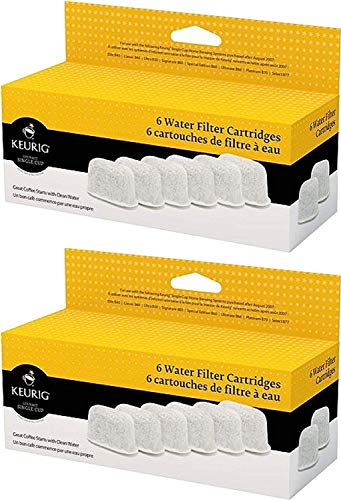Your coffee is 98% water, so it’s no surprise that the kind of water you use for your brew makes a huge difference.
In this post, we’ll look specifically at Keurig: what’s the best water for Keurig brewing and what kind of water should you be using?
Why you should care about the kind of water you use in your Keurig
The biggest concern about water from your tap is the hardness. Hard water contains high amounts of minerals like calcium, sodium, sulfate, and chloride.
So if you use this water kind to brew coffee, you are unintentionally reducing your Keurig’s life by building more scale or lime, not to mention compromising the taste of your coffee.
Some people deal with this issue by softening their water with a salt-based water softener.
However, the problem is just partially solved. Softened water may cause clogging around coffee grinds and tea leaves, making the ingredients less penetrable and the brewing process slower.
In terms of how it affects the machine, the slower process forms clogs in the brewer, leading to poor performance.
So what’s the best water for Keurig?
The best kind of water to use with your Keurig is filtered. This kind of water is the most purified where the amount of minerals is less than 1 PPM.
This makes sure that your brewer won’t build up any extra lime or scale, and will regularly produce good-tasting coffee.
In addition to this, filter water helps to decrease the frequency of the dreaded descaling routine.
I myself own a Keurig and I rely on purified drinking water to brew coffee. This way, I can get away with descaling my machine only every 6 months instead of the usual 3 months.
Many refrigerators are designed with a built-in filter, so you can easily install one to your sink for filter water to use. Or you can invest in a whole house filter.
Whatever way you choose, you can also consult a local water professional to make sure that you are making a wise investment.
So why do we suggest using a filter? A filter can help to remove minerals like sulfur, chlorine, and iron, which solve not only issues of your machine’s performance and longevity, but also those of poor tasting coffee and tea.
To get filtered water, you can choose to install the filter on your fridge, on your sink, let it free standing or invest in those which are supposed to go with.
Some Keurig models also come with in-built water filters, in which case you can use any kind of water you like.
Can you use bottled water with Keurig?
To some extent, bottled water is more recommended, but be careful before buying some or you won’t get your desired result.
Not all bottled water is the same quality!
Spring and mineral water are very high in minerals and this leads to eventual scale buildup in your brewer.
If you’re not careful, you may inadvertently make things worse.
What kind of water do you use with Keurig 2.0?
Please note that distilled water is not recommended for Keurig 2.0. It is so pure that the sensors in Keurig 2.0 can not operate properly with it.
So if you own a Keurig 2.0 brewer, only use tap water or regular filtered water, and just descale your machine every so often.
Frequently asked questions
Can you use distilled water in your Keurig?
You can only use distilled water in Keurig 1.0 models. Keurig 2.0 models won’t be able to brew with distilled water, as there are sensors inside that are not sensitive enough to work with distilled water.
Is purified water good for Keurig?
Absolutely! Using purified water from an RO filter or any other filter for that matter will greatly extend the life of your Keurig and also reduce the need for descaling it every so often. Purified water will also result in better tasting coffee.
Can I use spring water in my Keurig?
Spring water is generally very high in minerals, so you should avoid using it. The minerals will eventually build up on the inner pipes of the machine and you’ll have to descale it very frequently.
Recap and conclusion
To recap:
- Use filtered water for best results
- Do not use spring or mineral water
- Do not use distilled water in older Keurig 2.0 brewers




